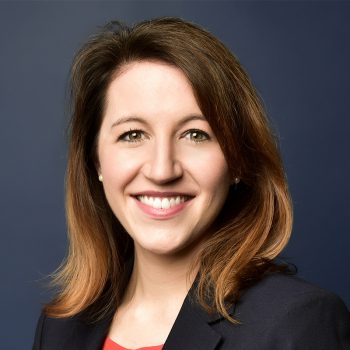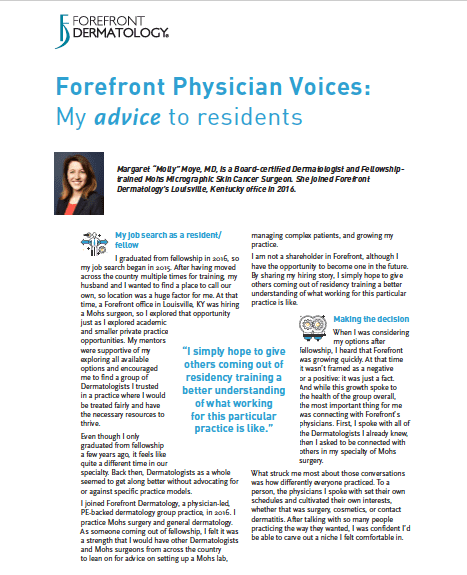Forefront Physician Voices:
My advice to residents

Margaret “Molly” Moye, MD, is a Board-certified Dermatologist and Fellowship-trained Mohs Micrographic Skin Cancer Surgeon. She joined Forefront Dermatology’s Louisville, Kentucky office in 2016.
My job search as a resident/fellow
I graduated from fellowship in 2016, so my job search began in 2015. After having moved across the country multiple times for training, my husband and I wanted to find a place to call our own, so location was a huge factor for me. At that time, a Forefront office in Louisville, KY was hiring a Mohs surgeon, so I explored that opportunity just as I explored academic and smaller private practice opportunities. My mentors were supportive of my exploring all available options and encouraged me to find a group of Dermatologists I trusted in a practice where I would be treated fairly and have the necessary resources to thrive.
Even though I only graduated from fellowship a few years ago, it feels like quite a different time in our specialty. Back then, Dermatologists as a whole seemed to get along better without advocating for or against specific practice models.
I joined Forefront Dermatology, a physician-led, PE-backed dermatology group practice, in 2016. I practice Mohs surgery and general dermatology. As someone coming out of fellowship, I felt it was a strength that I would have other Dermatologists and Mohs surgeons from across the country to lean on for advice on setting up a Mohs lab, managing complex patients, and growing my practice.
I am not a shareholder in Forefront, although I have the opportunity to become one in the future. By sharing my hiring story, I simply hope to give others coming out of residency training a better understanding of what working for this particular practice is like.
“I simply hope to give others coming out of residency training a better understanding of what working for this particular practice is like.”

Click the image above to download the testimonial.
Making the decision
When I was considering my options after fellowship, I heard that Forefront was growing quickly. At that time it wasn’t framed as a negative or a positive: it was just a fact. And while this growth spoke to the health of the group overall, the most important thing for me was connecting with Forefront’s physicians. First, I spoke with all of the Dermatologists I already knew, then I asked to be connected with others in my specialty of Mohs surgery.
What struck me most about those conversations was how differently everyone practiced. To a person, the physicians I spoke with set their own schedules and cultivated their own interests, whether that was surgery, cosmetics, or contact dermatitis. After talking with so many people practicing the way they wanted, I was confident I’d be able to carve out a niche I felt comfortable in.
Autonomy & support: the day-to-day balance
Since joining Forefront I have never once been told how to practice medicine, nor have I been asked to do things any differently than how I was trained to do them. Coming from the program I trained in, that means fairly conservative Mohs utilization; I probably excise tumors that others would do Mohs on. No one at Forefront has encouraged me to do otherwise.
In the area of autonomy, then, the reality closely matches the expectations I developed during the recruitment process, when I was assured I’d have complete clinical autonomy as well as access to an array of shared services.
Critiques of shared or “centralized” services suggest that these services may constrain physicians in some way, or make the culture feel more corporate. I have not found this to be the case. On the contrary, having scheduling and patient calls received centrally means that the phone is not constantly ringing in our office, so our nursing staff are able to fully participate in patient care and our front desk staff can focus on the needs of the patients in the office. I receive tasks from our central nursing staff related to patient needs or concerns through our EMR, which I take care of during the day during clinic downtime.
Academic practices are also switching to centralizing call triage and scheduling, often bundling various specialties together to achieve cost savings. At Forefront, our staff are managing 100% dermatologic concerns, which makes for a much shorter learning curve than if they had to handle multiple specialties.
No matter what the practice setting, it takes time for staff to learn a physician’s preferences for scheduling and patient care matters like post-op instructions. At this point in my career at Forefront, the dedicated individuals in central services who manage my patient concerns and Mohs scheduling know how I practice, and are part of my clinic team! In fact, I can always tell when someone new has been hired because for a couple months I’ll receive questions that our veteran staff already know how I would like handled. The thing is, it’s my responsibility to help get these new people up to speed, just like it’s my responsibility to train the people in my office. Something not taught in residency is the importance of investing, leading, and empowering your staff. It’s our job as physicians to establish the culture we want, and to provide the feedback to maintain it.
In this realm (and others), I’ve learned a lot from Forefront’s network of physicians. We have a true professional community here—I’ve had some amazing mentorship already, and my colleagues are genuinely eager to help me achieve my career goals. There’s always somebody to talk through stumbling blocks I’ve encountered or clinic issues I’d like advice about. I think these relationships would be more difficult to cultivate in smaller practices. Forefront is large enough that there’s tons of expertise to draw on—and it’s collegial enough that I know I’ll get a quick, informed response when I need it.
The PE question
In terms of the PE-backed model in general, I can’t say how it is working at any other PE-backed group practice. What I can say is that Forefront’s private equity backing isn’t particularly noticeable to me. My impression is that our physician leaders are steering the ship. Coding tips, clinical pearls, practice management suggestions, and bonus calculations come from our physician leadership. All communications come directly from physicians. If I have a concern or suggestion, I talk to our physician leaders.
Advice for residents
There won’t ever be a perfect work situation—every setting will have its benefits and drawbacks. Each individual resident has to decide what’s best for himself or herself based on the specifics—the practice location, patients served, compensation, practice niche and culture, etc. But all residents deserve to have unvarnished, unbiased information about the options open to them.
In my view, the most important thing a resident coming out of training needs to do is to find a group of people he or she trusts to work with. These people don’t need to be your best friends, but they need to be good partners. Making sure the people at Forefront were trustworthy and transparent was crucial for me.


